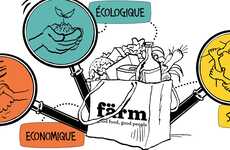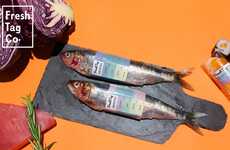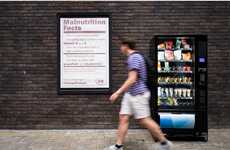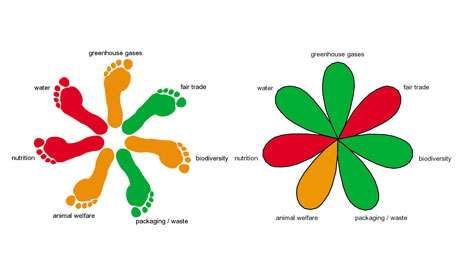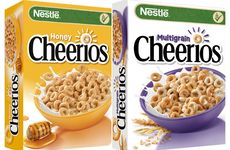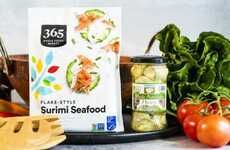
The UK's Omni-Standard System
Peter Brown — September 9, 2008 — Tech
References: journalisted
Which is better for you? Brown rice or cheesecake? Which is better for people? Beans from the local region or beans from a developing nation? To help unpack some of these everyday questions and inform choices in the supermarket, academics in the UK have proposed a new system for labeling food which would take account of the environmental and social costs as well as the health and nutritional benefits.
The “omni-standard” information would be translated into easy-to-understand information on food labels for consumers. The labeling system is dubbed “food flowers” since each petal indicates a food’s impact in a different area. The food flower would show the basic information, with more detail available online or sent to the shopper’s mobile phone.
Professor Tim Lang, from City University, London - who coined the term “food miles” - said he had come up with the idea help consumers make sustainable purchasing choices. “Do I eat green beans from Kenya, because they are good for me, or do I say no because there are four litres of water embedded in each stem of green bean?” asked Professor Lang.
"Health and environment, justice and equity are all surely reasonable and decent aspirations," Lang explained to a science festival in Liverpool, UK and that "we need a food system to improve standards across a variety of equally important fronts."
The “food flower” would be particularly helpful in allowing consumers to understand contradictory evidence and assertions. Fish - for example - is good for us, and government advice is to eat two portions a week. Yet fish supplies can be fragile and oceans unsustainably fished and so the ecological impact can be high. The labelling system could help us better understand such balances and shape our behavior accordingly.
Image Credit: Sustain
The “omni-standard” information would be translated into easy-to-understand information on food labels for consumers. The labeling system is dubbed “food flowers” since each petal indicates a food’s impact in a different area. The food flower would show the basic information, with more detail available online or sent to the shopper’s mobile phone.
Professor Tim Lang, from City University, London - who coined the term “food miles” - said he had come up with the idea help consumers make sustainable purchasing choices. “Do I eat green beans from Kenya, because they are good for me, or do I say no because there are four litres of water embedded in each stem of green bean?” asked Professor Lang.
"Health and environment, justice and equity are all surely reasonable and decent aspirations," Lang explained to a science festival in Liverpool, UK and that "we need a food system to improve standards across a variety of equally important fronts."
The “food flower” would be particularly helpful in allowing consumers to understand contradictory evidence and assertions. Fish - for example - is good for us, and government advice is to eat two portions a week. Yet fish supplies can be fragile and oceans unsustainably fished and so the ecological impact can be high. The labelling system could help us better understand such balances and shape our behavior accordingly.
Image Credit: Sustain
Trend Themes
1. Omni-standard Food Labels - The proposal of an omni-standard food labeling system that incorporates environmental, social, health, and nutritional information to help consumers make informed choices in the supermarket.
2. Food Flower Labeling System - The introduction of a food flower labeling system that visually represents a food's impact in various areas, providing basic information on the label and more detail online or via mobile phone.
3. Understanding Contradictory Evidence - The use of labeling systems to help consumers better understand contradictory evidence and assertions about the health and environmental impact of certain foods.
Industry Implications
1. Food and Beverage - The food and beverage industry can utilize the omni-standard food labeling system to provide transparent information to consumers, promoting sustainable and healthy choices.
2. Technology and Mobile - The technology and mobile industry can develop applications and platforms to support the food flower labeling system, allowing consumers easy access to detailed information on food labels via their mobile phones.
3. Environmental Sustainability - The environmental sustainability industry can leverage labeling systems to raise awareness about the ecological impact of food production and consumption, encouraging more sustainable practices.
1.7
Score
Popularity
Activity
Freshness


